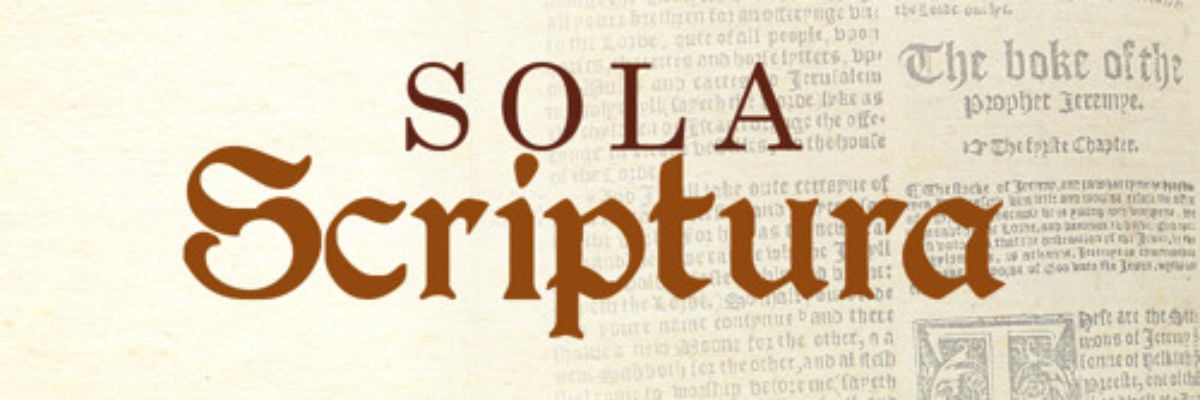
Audio only:
In this episode, Trent comments on the Southern Baptist “Nicene Creed Debate” and shows how it reveals a fatal flaw in Sola Scriptura.
Transcription:
Trent:
Recently the Southern Baptist Convention or the SBC made news over a debate they were having about whether they should add the Nicene Creed to their statement of faith from the year 2000.
SBC Speaker:
I move that the messengers of this annual meeting of the Southern Baptist Convention affirmed the Nicene creed.
Trent:
Ultimately, the SBC chose not to adopt an icing creed into their statement of faith. But this episode really demonstrates what I call the Protestant creed problem, as well as an inherent tension in the doctrine of Sola Scriptura that many Protestants want to get away from, but they aren’t sure how to do that. So here’s what I mean. Many Protestants say Catholics misunderstand Sola Scriptura. They misunderstand it as saying the Bible is the only rule of faith for the church. They say that’s not true. That’s Solo Scriptura, not Sola Scriptura, they say that Sola Scriptura is the claim that the Bible is the only infallible rule of faith for the church. However, there are still other rules of faith for the church like ancient creeds, ecumenical councils, and even church confessions. All of these provide a protective guardrail for doctrinal disagreement. Here’s Stephen Lorance, one of the convention members who proposed to add the Nicene Creed to the Baptist statement of faith.
Stephen Lorance:
So listen, I get it. Christianity is not a creed. It is about the Lord Jesus Christ himself. But we know this Christ through his scriptures, the ultimate authority, his amerit and inspired word, but we read those scriptures and we proclaim that gospel surrounded by a great cloud of witnesses, the church of Jesus throughout the ages. We need to teach the next generation, proclaim the gospel. We’ve got to do it within the guardrails of orthodoxy. We want them to sing, no part to step up and sing, but they need to sing in tune with that old time religion.
Trent:
This meme I’m showing here does a good job summarizing what Lorent and many others envision. So on the one hand, we have Sola Scriptura where individuals only read the Bible and as a result they go off in every kind of crazy theological direction. And on the other hand, we have solo scriptura where people still theologically disagree, but they have other authorities like the creeds or early Christian history to keep them within the bounds of orthodoxy as they disagree about secondary and tertiary doctrines. However, this authority structure either is not Sola script Torah. It isn’t truly sola script Torah or when it’s put into practice, it collapses back into Sola script Torah. So it fails in one of two ways. First, if this whole paradigm treats scripture, the creeds and the early church as being equal in authority, then it’s not sola script Torah. Because if Sola Scriptura is true, these sources cannot be equal in authority because Sola Scriptura says that scripture is the only infallible authority.
If you can’t become Aryan because the council of EA condemns Arianism, well then the ecumenical councils become another infallible authority alongside scripture, and as a result, solo s scriptura is falsified. Or on the other hand, you just end up collapsing the entire structure back into solo scriptura because a Christian could always disregard these guardrails if he’s convinced that scripture is actually on his side. For example, in a June, 2024 podcast, the Protestant philosopher William Lane Craig doubled down on his longstanding claim that monotheism, that Christ had only one will rather than two wills, one human and one divine is Orthodox. Even though this heresy was condemned at the third ecumenical council of Constantinople,
William Lane Craig:
And I think it’s because the students answer the question correctly, the will is a function of the person, and so Monoism is true, but the sixth ecumenical council voted in favor of dim it, declared that Christ in fact has two wills, one human and one divine. But this is a viewpoint from which I demure Kevin. I know it’s promulgated by an ecumenical counsel, but as a Protestant who believes that scripture alone is our ultimate and final authority, I think even the statements of ecumenical counsels have to be brought before the bar of scripture. And I see nothing in scripture that would warrant saying that Christ has two wills.
Trent:
And in my debate with Gavin Ortlund on Sola Scriptura, Ortlund was unwilling to say, William Lane Craig had denied an essential teaching of the faith in upholding monotheism and its claim. Christ has only a divine will, not a human will is belief in Christ’s human will, an essential doctrine.
Gavin Ortlund:
I love you, William Lane. Craig. Hello. I would say no, but I would say it’s very close.
Trent:
The ecumenical councils can’t have binding authority if a Christian can simply ignore anything they say as long as he thinks his personal interpretation of scripture or his own philosophy trumps what the councils and the ancient creeds say. Why can Protestants say we can disregard third constant de Christology on Monoism or second Ns teaching on icon veneration, but not first Ns teaching on Christology? Why should Protestants believe Cal’s Christology? While at the same time ignoring the letter from Pope Leo read at the Council of Caldon, which the attendees responded. Peter has spoken through Leo, the Protestant historian, j and d Kelly writes about the state of the church at the time of the Council of Caldon. By the middle of the fifth century, the Roman Church had established dere as well as defacto a position of primacy in the West, and the papal claims to supremacy over all bishops of Christendom have been formulated in precise terms.
These ancient creeds and councils also can’t have authority if modern Christians can just radically reinterpret what the conciliary decrees and the Creole statements originally meant. For example, baptists typically hold to believers baptism according to them. Baptism is a way to show a person already received the forgiveness of sins through faith. Baptists usually deny that baptism itself communicates the forgiveness of sins or baptismal regeneration. Now, this is a problem some members of the Southern Baptist Convention raised when it comes to adding the nice scene creed to their statement of faith because the nice scene creed says, I confess one baptism for the forgiveness of sins. This part of the creed is talking about baptismal regeneration. There is one baptism that is for or has as its purpose the forgiveness of sin, but the editor of the Baptist Standard ask the SBC members who propose the amendment the following question, how should Southern Baptists understand baptism water or spirit?
How should they understand remission of sins? Is baptism Salvi, the defenders of adding the Nicene Creed to the Baptist statement of faith responded this way? This refers to baptism in the spirit or regeneration which occurs with faith. Water baptism is the outward confession of that prior inward reality. Augustine’s arguments for water, baptism, regeneration, which we rightly reject, came more than a century and a half after the Council of Nsea. But this is all wrong. Even Protestant theologians, historians and apologists admit that baptismal regeneration via liquid water was the universal belief in the early church. J and d Kelly in his book on the history of Christian doctrine writes from the beginning, baptism was the universally accepted rite of admission to the church as regards its significance. It was always held to convey the remission of sins. Everett Ferguson, a Protestant who has written one of the definitive studies on baptism in the early church says, although in developing the doctrine of baptism, different authors had their particular favorite descriptions.
There is a remarkable agreement on the benefits received in baptism, and these are present already in the New Testament texts. Two fundamental blessings are often repeated. The person baptized received forgiveness of sins and the gift of the Holy Spirit. Finally, William Webster is a Protestant apologist who wrote a book that tried to debunk the historical pedigree of Catholic doctrine, but even he admits the doctrine of baptism is one of the few teachings within Roman Catholicism for which it can be said that there is a universal consent of the fathers. In the second century, St. EU quoted Jesus giving the great commission to the disciples to baptize people in all nations, and he said Jesus gave to the disciples the power of regeneration unto God. He also referred to being spiritually regenerated as newborn babes, even as the Lord has declared unless a man be born again through water and the spirit, he shall not enter into the kingdom of heaven.
John three five, which is all a reference to water baptism. So all of this can be found centuries before the time of St. Augustine. I also cover this evidence in my previous episode called Protestant should Embrace This Universal Doctrine of the Church Father. So check out that episode if you want more on the historical teaching of baptism regeneration, and ultimately, I think this is why the SBC chose not to adopt the creed along with the creed’s use of the phrase one, holy Catholic and apostolic church. There’s just too many members who know church history who would say that Christians historically and universally held two beliefs that contradict Baptist theology. So the only way one can say as a Baptist that their faith rhymes with old time religion is if you radically reinterpret what the ancient church believed so that you can disregard what they actually believed. Also, if you’d like a more in-depth treatment of this topic, check out my colleague Joe Hesh Meyer’s recent episode one Holy Baptist and Apostolic Church at the Shameless Popery Podcast, as well as his book, the Early Church was the Catholic Church, which has an entire section on the history of baptism in the early church. So thank you guys so much and I hope you have a very blessed day.



